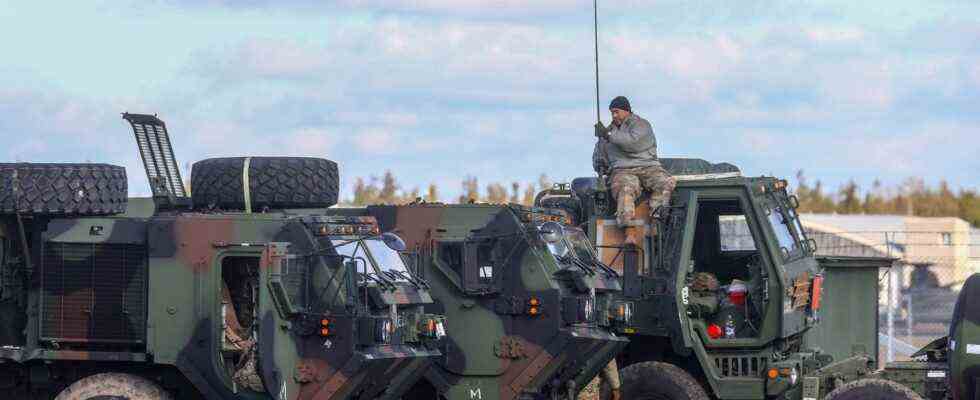One “scent of Munich” floating in the air about Ukraine, as British Defense Minister Ben Wallace said on Sunday February 13? Nobody is able to say today if the situation is the same as at the time of the 1938 agreement with Nazi Germany, before the Second World War. But Westerners fear in any case the swing towards war, at the end of a weekend of continuous escalation with Russia.
Since Friday evening, the situation seems to be accelerating, while the United States has said it fears an invasion “imminent” of Ukraine and that Germany considered the situation “critical”. Franceinfo looks back on two days of invective and failed diplomatic initiatives.
Act 1: the United States worries about an imminent invasion
The Beijing Olympics started a week ago, Friday February 11, when Jake Sullivan spoke at the White House. For Joe Biden’s national security adviser, the traditional Olympic truce does not exist in the Ukrainian file: the invasion of Ukraine can “intervene at any time” according to him, even before the end of the competition, on February 20. The United States believes that the Russian invasion would certainly begin with aerial bombardment and could include “a swift assault” against Kyiv.
Act 2: Russians and Americans redeploy their forces
After alarmist statements about an imminent invasion, Washington is busy preparing for the conflict. The United States decides to send 3,000 additional soldiers to Poland to “reassure NATO allies”. Based in Fort Bragg, North Carolina, they were placed on alert at the end of January at the request of Joe Biden. They should arrive there “At the beginning of next week”. On Saturday, at midday, the Pentagon ordered the withdrawal of 160 American soldiers who were training Ukrainian forces for the “reposition elsewhere in Europe”.
At the same time, Russia also continues to prepare for a possible offensive. On Saturday, Moscow claims to have started to reduce its diplomatic presence in Ukraine in the face of “Provocation” from the Ukrainian authorities or from “third country”.
Act 3: deadlocked diplomatic exchanges
Faced with the growing risk of the outbreak of a conflict in Ukraine, the telephone bells are ringing louder in an attempt to relaunch dialogue. The first interview takes place on Saturday noon, French time, between Antony Blinken, American Secretary of State, and Sergei Lavrov, Russian Minister of Foreign Affairs. The latter considers that the American declarations on an imminent invasion of Ukraine are a “provocation”.
Emmanuel Macron calls Vladimir Poutine shortly before 2 p.m., for an exchange of more than an hour and a half. The French president affirms, at the end of this call, that a “sincere dialogue” is not “not compatible with climbing” military, two days after a face-to-face meeting in Moscow which solved nothing.
Around 5 p.m., it was Joe Biden’s turn to speak by telephone with Vladimir Putin. The interview, which lasts a little over an hour, does not bring any “fundamental change”according to an American official: Joe Biden warns his Russian counterpart of the “severe and rapid repercussions”while the Kremlin evokes around 8 p.m. a “hysteria” American at “its peak”. The pursuit “contacts at all levels” is one of the only positive signs of this call. But while this diplomatic sequence could have started a de-escalation, it is not.
Act 4: Westerners call on the population to be careful
With diplomacy at an impasse, Western countries are taking steps to prepare for a possible conflict, starting with messages to their people. Saturday evening, Paris advises the French against traveling to Ukraine. On the other hand, at this stage, the government does not recommend that its nationals leave Ukrainian soil, unlike the United States, the United Kingdom, Germany, the Netherlands or Belgium.
The airline KLM, part of the Air France-KLM group, announces that it is suspending its flights to Ukraine until further notice.
Act 5: the tension shifts to military terrain
The tensions between Russia and the United States also find an echo on the military ground. On Sunday morning, the US military denied claims by Moscow that a US nuclear submarine was chased by one of its destroyers on Saturday morning off the Kuril Islands in Russian territorial waters.
According to the Russian Defense Ministry, the destroyer of the Russian Pacific Fleet Marshal Shaposhnikov broadcast a submarine message ordering the Virginia-class submersible “to surface immediately”. Faced with his refusal, “means” unidentified were used, forcing the American submarine to “leaving the territorial waters of Russia at full speed”. “There is no truth in Russian claims regarding our operations in their territorial waters. We fly, sail and operate safely in international waters”said Captain Kyle Raines, spokesman for the American Command for the Indo-Pacific region, refusing to comment on the precise location of American submarines in the region.
As Russia launched new naval maneuvers in the Black Sea on Saturday to practice “defend” Crimea, the situation is now “critical”according to Germany.

